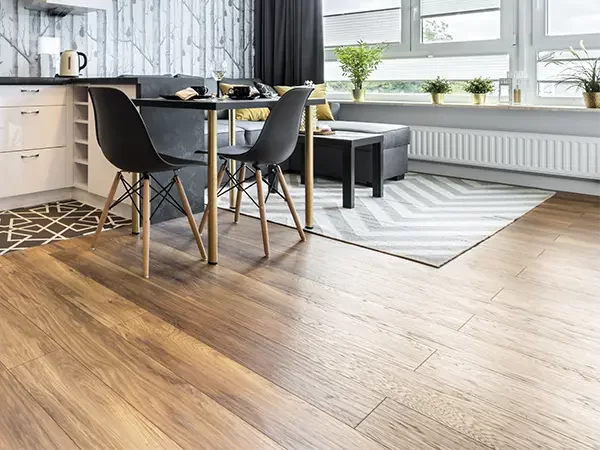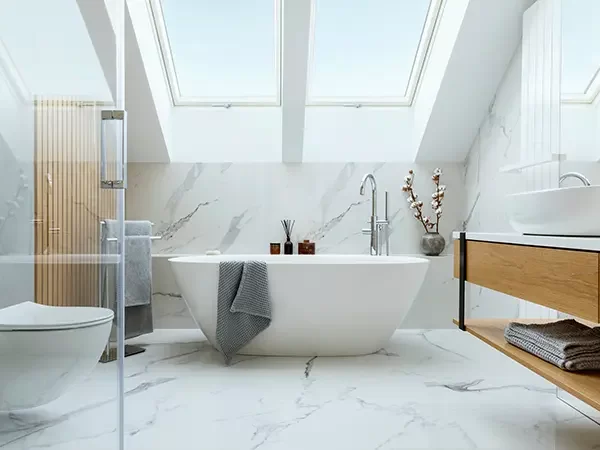Bathroom Flooring Installation In Papillion, NE
Upgrade your bathroom with perfectly fitted floors with our expert installation services in Papillion.
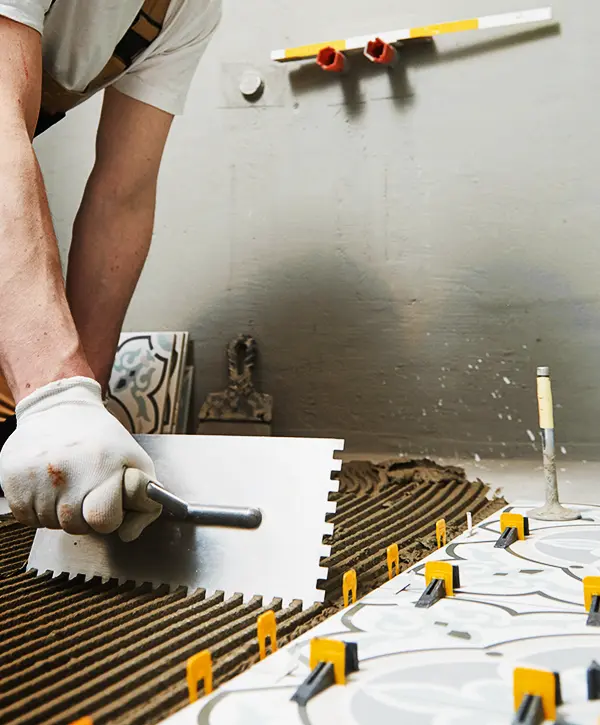
Embarking on a bathroom flooring project with unproven methods can lead to uneven surfaces and costly repairs. With our professional installation services, you’ll enjoy the peace of mind that comes from flawless execution, resulting in a stunning, durable floor that elevates your Papillion home’s aesthetic and value.
Rather than facing the inconvenience of frequent maintenance, our expert team ensures your new vinyl plank flooring withstands the test of time, offering a seamless blend of function and style. Embrace the comfort and satisfaction of a professionally installed floor, truly transforming your bathroom into a comfort zone. Discover our professional touch – it’s the smart choice for lasting beauty and practicality.
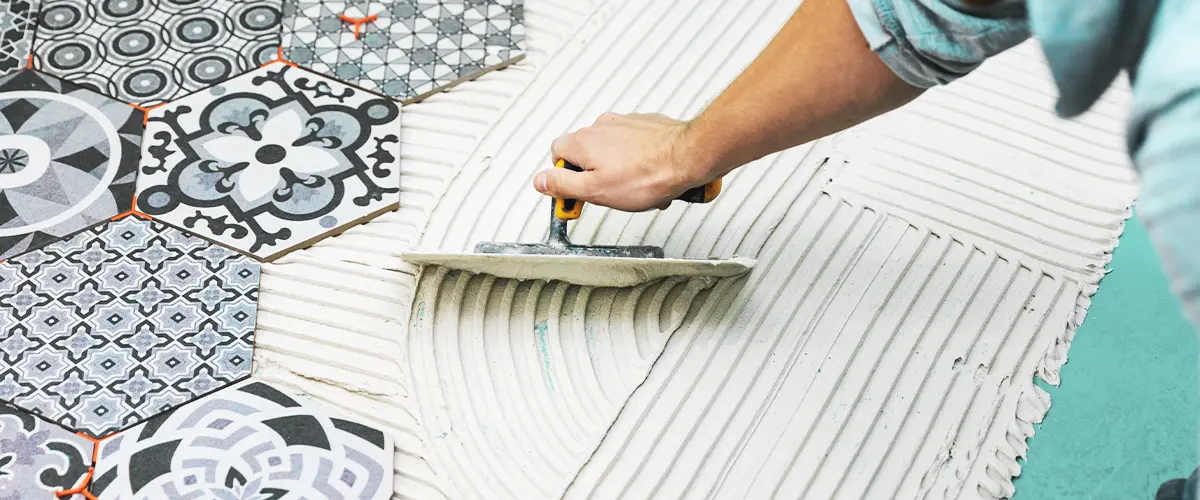
Get Your Bathroom Flooring Installation Done By Experts
Our unparalleled service has revolutionized industry expectations, establishing unprecedented standards for quality and customer satisfaction. Check out the benefits we offer:
Get ready to enjoy:
- Expert Carpenters
- Transparent Pricing
- Polite & Kind Team
- Superior Communication
- Fast Service Delivery
- Unique Designs
Why Bathroom Flooring Installation Is a Worthwhile Investment
Investing in professional bathroom flooring installation ensures high return on investment through enduring quality and elegance. Imagine comfortably hosting guests, showcasing your impeccable bathroom without fear of wear and tear – a direct result of our expert service.
- Long-Term Durability
With a focus on using premium materials and meticulous techniques, our installations endure the rigors of daily use, saving you money on potential future repairs.
- Elevated Home Value
Quality bathroom flooring is a key selling point. Our installations enhance appeal and can significantly increase your home’s market value.
- Hassle-Free Maintenance
Our flooring solutions are designed for easy cleaning and resistance to moisture, granting you more time to enjoy your space, worry-free.
Upgrades Homeowners Make When Installing New Bathroom Flooring
Most homeowners seize the opportunity of a new bathroom floor installation to revamp their space with additional enhancements, creating a more functional and luxurious sanctuary.
Common Upgrades with New Bathroom Flooring
- Modern Vanities & Sinks: Upgrading to sleek, contemporary fixtures that complement the new flooring.
- Luxury Bathtubs or Walk-in Showers: Transforming the bathing experience with elegance and increased accessibility.
- Efficient Toilets: Installing water-saving, high-efficiency models for a greener bathroom.
- Stylish Faucets & Hardware: Selecting modern, durable hardware that provides the perfect finishing touch.
- Elegant Lighting Fixtures: Incorporating lighting that accentuates the beauty of the new floors and enhances the bathroom ambiance.
- Updated Wall Tiles: Aligning the wall décor with the new flooring for a cohesive look.
- Heated Flooring Systems: Adding the ultimate touch of comfort with radiant floor heating technology.
Have A Bathroom Floor As Beautiful As This
Your bathroom could look just as stunning as these examples! Let these photos inspire your project’s potential. Take a look at the gallery below to get a sense of the level of quality of our services:
60+ bathrooms remodeled
25 years of construction experience
3-year craftsmanship warranty



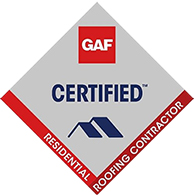







Bathroom Flooring Installation Costs In Papillion, NE
No two bathroom flooring projects in Papillion are the same, so it’s essential for us to fully understand your specific needs to provide an accurate quote. On average, homeowners invest between $1,500 and $4,500 for our services, but please note this is just an estimate.
Rest assured, we are committed to transparent pricing and will work with you to understand your vision and deliver an exact quote tailored to your project.
What The Community In Papillion, NE, Thinks About Us
Our heartwarming customer testimonials reflect the satisfaction and joy brought by our work. We’re truly thankful for the support. Check out the beautiful things people have to say about us:
A
A Mystery
Tony and Mike at Home Matters Construction are hands down the best in town. Not to mention, they restored my faith in contractors. I had several bad experience before working with them. They are professional, have pride in their work and make sure you are completely satisfied with the work. Not to mention they are pretty hilarious.
They put in luxury vinyl plank floors in my kitchen, bathrooms. They look absolutely amazing. I highly recommend them and will work with them on future projects.
K
Kyle Frerichs
HMC are great! They were upfront and professional about all aspects of our basement remodel. They worked with us on our floor plan and gave insight about better ways to install or incorporate certain parts of the build.
They gave us exactly what we wanted and everything was held to a very high standard. Everyone was professional, respectful, and very great at their job! I wish I could give more stars on this review. 5+ stars in our book.
Benefits of Working With Us Here at HMC Construction
At HMC Construction, we are seasoned professionals committed to excellence. Each team member, respectful and polite, treats your home with care, ensuring a positive experience throughout your project’s progression.
- Cost-Effective Solutions
Choosing us means your bathroom flooring will be done right the first time, saving you the headache and expense of future repairs. We believe in delivering lasting value for your investment.
- Aesthetic Excellence
Our designs are not just floors; they’re the canvas of your home’s character. We create beautiful, functional bathroom floors that reflect your personal taste and uplift your living space.
- Proven Expertise
With years of hands-on experience, our expertise is unmatched. We bring a level of skill and knowledge to your project that ensures superior results, leaving no detail overlooked.
Experience Simplicity with Our 3-Step Basement Remodeling Process
Choosing Home Matters means embarking on a stress-free journey towards upgrading your space. Our streamlined 3-step process ensures that everything is covered, allowing you to simply enjoy the transformation of your bathroom.
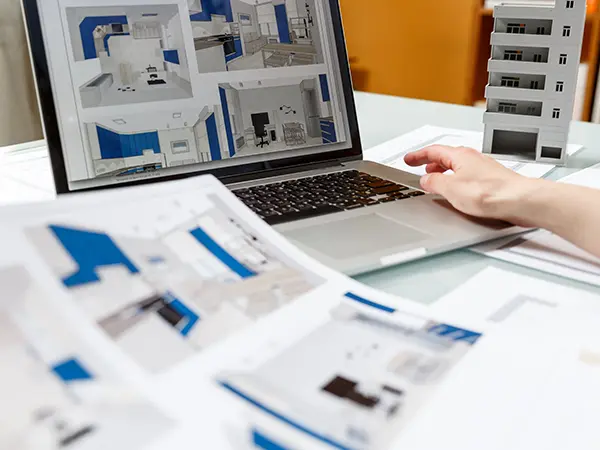
1
Collaborate
Engage with our team to tailor a vision that suits your home’s unique flair and function.
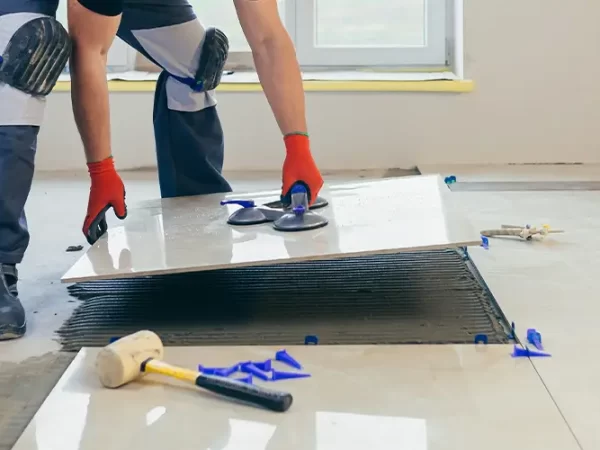
2
install
Witness skilled craftsmanship as we meticulously bring your custom design to life.
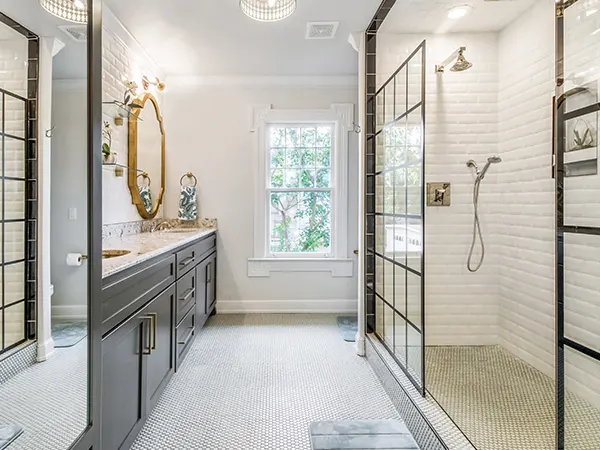
3
Enjoy
Step into your newly transformed bathroom and indulge in the comfort and luxury.
Bathroom Flooring Installation in Papillion, NE - FAQs
Our team at Home Matters Construction takes pride in efficient bathroom flooring installations. We specialize in vinyl plank flooring, ceramic tile, and luxury vinyl tile. Our experienced team can install these flooring options quickly, typically within a 1-3 day window. We ensure a smooth surface, proper sealing, and attention to detail, so you can enjoy your new bathroom floor for years to come.
We specialize in bathroom flooring installation, offering a wide range of options like vinyl plank flooring, ceramic tile, and luxury vinyl tile. Our experts guide you in choosing materials that complement your fixtures. From vinyl plank flooring to tile floors, we ensure a seamless integration with your bathroom’s aesthetic. Trust our team to handle the entire process, from prepping the floor to applying caulk. We pay attention to every detail to achieve a flawless finish. Enhance your bathroom with our top-quality flooring solutions!
We offer a variety of eco-friendly flooring options, including vinyl plank flooring, ceramic tile, hardwood floors, luxury vinyl tile, sheet vinyl flooring, and vinyl tile. During our collaboration phase, we can discuss these materials and help you select an option that aligns with your environmental values and design vision.
Our aim is to minimize disruption to your daily routine. We often complete projects in stages to ensure you have access to your bathroom. Our team will discuss the schedule with you in detail prior to beginning work.
Indeed, we do. We stand by the quality of our work with a comprehensive warranty that covers both materials and labor, offering you peace of mind that your investment is protected.
Upon completion of your project, we provide you with maintenance tips and best practices to ensure your flooring remains in pristine condition. Our flooring solutions are designed for easy upkeep, aligning with our hassle-free philosophy.
Our dedication to craftsmanship, tailored customer service, and transparent pricing are the foundations of our success. Coupled with our swift service delivery and unique designs, we provide an unparalleled bathroom remodeling experience.
Starting is as simple as reaching out to us. We’ll schedule a consultation to understand your needs and preferences. Once we have a clear idea of your vision, we’ll provide an exact, tailored quote. Let’s bring your dream bathroom to life together. Contact us today!
Count On Us For Your Bathroom Flooring Installation

Tony Inzauro
Embark on the transformation journey—there’s never been a better time to enhance your home. Create spaces that truly reflect you. Call us now at (402) 661-0910 and let’s start your project today!
Other Services you Might be interested in...
Nestled in the heart of the Midwest, Papillion, NE is a vibrant community brimming with small-town charm and big-city amenities. This gem is noted for its picturesque main street, the historic portal of Portal School, and the serene beauty of Walnut Creek Lake & Recreation Area. Papillion is more than a point on the map; it’s a place where history and progress coalesce, creating an exceptional haven for both residents and visitors alike.

